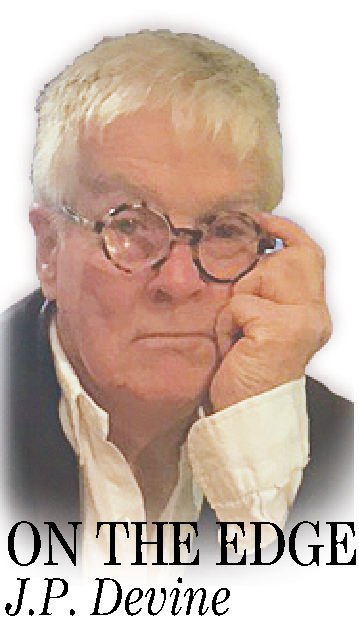Jimmy Cagney. I always think of Jimmy on the Fourth of July. Of course I do. His Warner Brothers’ “Yankee Doodle Dandy” was always one of my favorites.
I can think of no Cagney movie that wasn’t on my list of favorites. But the one at the top will always be Raoul Walsh’s “The Roaring Twenties.”
I first saw it at a matinee on the Fourth of July, when I was about 8 years old, sitting in the fifth row of the Michigan Avenue movie house on a hot Sunday afternoon, munching popcorn and balancing my Pepsi-Cola between my legs.
I was always afraid of the noise of the Fourth, so when the fireworks started going off up and down the alley in my block, my sister Rita would take me to the movies, and that’s where I first saw Jimmy Cagney.
My brother Kerm did the best impression of Cagney, but before that day, I had no idea what he was doing.
Everyone in the family seemed to know. The firemen at the firehouse down the block who all knew Cagney loved it. When Kerm did his bit, they would all clap and throw pennies at him.
So now, on this day, I was going to see what everyone was laughing at.
“Roaring” was actually just another Warner Brothers B gangster movie directed by the great Walsh, but I didn’t know any of that then. I only knew that if I could sit through it, Bugs Bunny was next.
Everyone was right. Kerm’s Cagney was spot-on perfect. I watched Cagney/Kerm shoot and fistfight his way through the movie right up to the final scene, when Cagney/Kerm was being chased down a big-city street full of blowing snow by gangsters who were trying to kill him.
Finally, Cagney, who was playing Eddie Bartlett, the down-on-his-luck bootlegger, ran up some church steps just as a bullet hit him and took him down.
I was struck dumb. My eyes filled with tears. I didn’t know Cagney from Clark Gable, but there was my beloved big brother Kerm hit by a bullet and dying on the church steps, cradled in the arms of an old lady, maybe his mother.
Of course, it was the wonderful Gladys George, playing his fallen angel of a nightclub singer.
Rita could see what was happening to me. She got me up the aisle to the front door, where I stopped and looked back at the screen, hoping Kerm would get up and walk away. But he didn’t.
Anyone who remembers the movie knows how they played up the violins when a cop stopped, took out a notebook and asked Gladys”Well, who is this guy?”
“This is Eddie Bartlett” …
“What was his business?”
Pause. “He used to be a big shot.”
Oh boy! One violin became a hundred, along with oboes and brass when the credits rolled.
Why do I remember so much? Because I’ve seen that movie maybe two dozen times, and now I own it. When I play it, I stop it before it gets to that scene. Enough is enough.
But there’s more. In the ’60s, I was playing a small part in “The FBI” with Efrem Zimbalist Jr. on the back lot of Warner Brothers Studios.
We had taken a lunch break, and the crew gave us all special box lunches. Eager to get out of the hot sound stage, I took my lunch and walked far back on the old, fake city streets and sat at the bottom of a long row of stairs of what looked like a court house.
Halfway through my fried chicken it dawned on me. I looked around at what was left of the building.
Behind me was the facade of a 1930s New York church. I was sitting on the very steps where gangster Eddie Bartlett, aka Cagney/Kerm, had died in Gladys George’s lap in “The Roaring Twenties.”
I stood up for one last look when two workers came over, asked me to move, and began ripping up the steps of the church where the big shot of my childhood had died.
I stepped out of the way as the youngest of the crew, a summer-job kid of no more than 18, slammed a hammer down where I was sitting.
“Excuse me,” I said. “Did you know that Jimmy Cagney died here?”
“Who?”
Jimmy Stewart once said, “The great thing about the movies is that you’re giving people little tiny pieces of time that they never forget.”
On that day I got my favorite tiny piece of time back, one I will never, ever forget.
J.P. Devine is a Waterville writer.
Send questions/comments to the editors.


